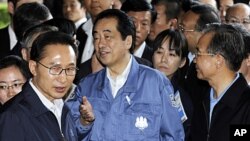Leaders of Japan, China and South Korea are in Japan to discuss measures to help disaster response and nuclear safety in East Asia. The leaders visited Fukushima city, about 50 kilometers from the stricken Daiichi nuclear power plant and paid their respects to the 24,000 people dead or missing following the March 11 earthquake and tsunami.
Chinese Premier Wen Jiabao and South Korean President Lee Myung Bak accompanied Japanese Prime Minister Naoto Kan on a visit to an evacuation center in Fukushima City.
At the center, they spoke to some of the thousands of people displaced by the world's worst nuclear accident since the Chernobyl crisis in 1986.
The South Korean and Chinese leaders arrived Saturday morning in Sendai, in disaster-hit Miyagi prefecture, and both made individual visits to places in the region.
President Lee visited Natori City where a massive tsunami swept away everything within several kilometers of the coast. He laid flowers and spoke to reporters
President Lee says he is looking forward to the fast recovery of the region.
Chinese Premier Wen visited the site of a company where a Japanese manager led 20 Chinese workers to safety, shortly before he was drowned in the tsunami waters. The act made headlines in China at the time.
Both China and South Korea sent emergency rescue teams to Japan in the days after the earthquake and tsunami disaster.
After visiting Fukushima, the three leaders moved to Tokyo where their fourth annual trilateral summit is due to begin on Saturday evening with a formal dinner.
Talks between the three countries will take place on Sunday morning. They are expected to agree on measures to help disaster response and nuclear safety in East Asia.
Also up for discussion will be restrictions on Japanese food imports imposed after the nuclear disaster in Fukushima.
Japanese Prime Minister Naoto Kan said ties between the Japan and its two most important neighbors have been strengthened by the disaster, but history continues to put a strain on the relationships. A reminder of that came just three weeks after the earthquake, when the Japanese government approved new history textbooks that reiterated the country's claim to small islets that both countries claim.
East Asian Leaders Visit Fukushima Ahead of Regional Summit




